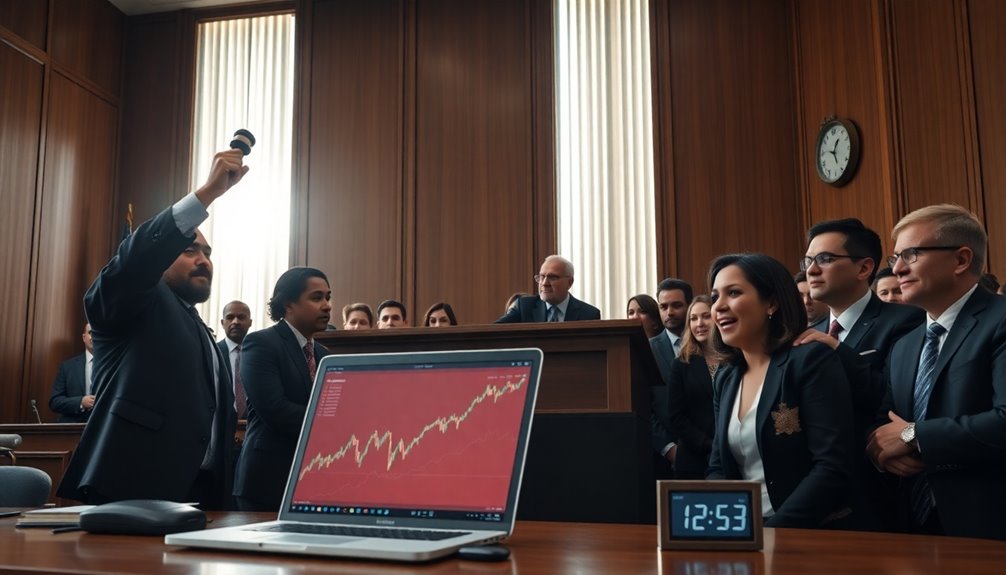The recent court decision siding with Coinbase is a game changer for the crypto industry. You'll see that the judge granted Coinbase an appeal, allowing them to challenge the SEC's claims at a higher court. This ruling pauses current litigation and questions the SEC's authority over digital asset transactions. It also hints at reduced SEC oversight on staking programs, which could boost innovation. As courts increasingly scrutinize the SEC's actions, it's clear that this case could redefine regulatory standards for cryptocurrencies. Keep an eye on ongoing developments to grasp the full impact of this landmark decision.
Key Takeaways
- Judge Katherine Failla's ruling grants Coinbase an interlocutory appeal, allowing a challenge to SEC claims at the Second Circuit Court of Appeals.
- The decision pauses district court litigation, aiming to clarify regulations surrounding digital asset transactions.
- Coinbase contests SEC allegations of operating as an unregistered exchange, potentially reducing SEC oversight on staking programs.
- The ruling reflects growing judicial skepticism towards SEC's authority and regulatory approach in the cryptocurrency space.
- Increased scrutiny of SEC actions raises concerns about transparency and innovation stifling within the crypto industry.
Coinbase's Legal Victory Explained

Although the legal battle between Coinbase and the SEC has been intense, a recent court decision has provided Coinbase a significant advantage.
Judge Katherine Failla granted Coinbase an interlocutory appeal, allowing you to challenge the SEC's claims at the Second Circuit Court of Appeals. This decision halts district court litigation and advances the case resolution by seeking clarity on digital asset transactions under securities law.
The SEC opposed the appeal, but the judge recognized its importance in addressing fundamental legal questions. By contesting allegations of operating as an unregistered exchange and selling unregistered securities, Coinbase aims to redefine the legal landscape for digital assets.
This ruling could significantly impact regulatory burdens across the entire crypto industry, potentially leading to a reduction in SEC oversight on staking programs.
SEC's Authority Challenged Again

As courts increasingly scrutinize the SEC's authority over cryptocurrency regulations, questions arise about the agency's decision-making processes and enforcement tactics. Critics argue the SEC's actions are often arbitrary and lack transparency, leading to confusion and stifling innovation. The agency's selective enforcement of securities laws has prompted courts to challenge its practices, particularly after rulings like the Coinbase case, which demanded clearer reasoning behind its decisions. Furthermore, the SEC's approach may flout the Administrative Procedure Act, raising concerns about its statutory authority. With the Supreme Court expressing skepticism, the SEC finds itself under intense scrutiny, forcing it to reconsider how it regulates the rapidly evolving crypto landscape and its impact on the industry's future. As a result, the SEC must navigate a complex environment where only 13.7% of financial advisors currently engage with clients on crypto, reflecting the industry's cautious stance.
Crypto Price Volatility Analysis

Crypto price volatility is heavily influenced by various factors, making it essential for investors to understand the dynamics at play.
Market sentiment plays a crucial role; positive news can boost prices, while negative news often causes sharp declines. Emotional trading driven by fear or greed amplifies these fluctuations, leading to increased liquidity and herd behavior. Additionally, the limited supply of cryptocurrencies like Bitcoin means rising demand can significantly push prices higher. Moreover, regulatory changes can prompt sudden shifts in market dynamics, affecting investor confidence and trading behavior.
Regulatory changes and economic indicators also impact market perception, causing sudden shifts. Finally, security breaches can trigger mass sell-offs, as investor confidence plummets.
Understanding these elements can help you navigate the unpredictable crypto landscape more effectively.
Corporate Blockchain Integration Trends

With businesses increasingly recognizing the transformative potential of blockchain technology, corporate integration trends are rapidly evolving.
Many companies are enhancing their value chain management by leveraging blockchain for improved transparency and traceability. This integration provides unmatched visibility into product lifecycles, fostering trust and integrity regarding product origins. Moreover, the integration with AI allows for advanced data analysis, further optimizing operational efficiencies.
Additionally, decentralized finance (DeFi) is reshaping financial management, allowing greater operational efficiency and transparency.
However, challenges persist, including a shortage of skilled blockchain experts, complex user interfaces, and evolving regulations. These hurdles can hinder smooth implementation, but overcoming them is essential for maximizing blockchain's benefits in corporate settings.
As you explore these trends, you'll see how they can revolutionize your business operations.
Regulatory Impact on Cryptocurrency

Blockchain integration is reshaping business operations across various sectors, but the cryptocurrency market faces its own set of challenges, primarily driven by regulatory scrutiny.
The SEC wields significant authority, using the Howey Test to classify cryptocurrencies as securities, which impacts their regulation. This can lead to increased compliance costs for exchanges, creating barriers without completely stifling the market. Significant growth in the cryptocurrency market has exacerbated the need for clear regulatory guidelines.
Multiple regulators can create overlaps and gaps, complicating the landscape further. Regulatory authorities focus on consumer protection, cybersecurity, and market integrity, enforcing strict compliance expectations.
The recent Coinbase case highlights the ongoing tension between innovation and regulatory requirements, as the court ruled that certain services and tokens fall under SEC jurisdiction.
This evolving regulatory environment will shape the future of cryptocurrency.
Market Adaptation Strategies Ahead

As the cryptocurrency landscape evolves, firms must adapt to maintain their competitive edge. You should focus on streamlining your product offerings, concentrating on the most profitable assets to enhance efficiency.
By reallocating resources and cutting costs in non-essential areas, you can invest in high-potential projects. Emphasizing operational efficiency through automation will also help reduce overhead.
Additionally, diversifying across cryptocurrencies can mitigate risks from market volatility. Develop robust risk management strategies and stay updated with the latest blockchain developments.
Embrace technological advancements, like AI agents and tokenization, to transform your operations. Furthermore, the increasing demand for specialized skills in blockchain development highlights the necessity for workforce adaptation in the industry. Lastly, keep an eye on the anticipated public listings of crypto companies, as they could attract more investors and enhance the industry's legitimacy.
Adaptation is key to thriving in this fast-paced environment.
Frequently Asked Questions
What Are the Implications of This Case for Retail Investors?
This case could reshape how you view your investments in crypto. You might see clearer regulatory guidelines emerging, which could help you understand the risks and protections available.
If the SEC clarifies its jurisdiction, it might lead to better investor safeguards against fraud.
You'll also notice changes in how staking programs and transactions are treated, impacting your trading strategies and the overall landscape of crypto investments.
Stay informed to navigate these developments effectively.
How Will This Ruling Affect Other Crypto Exchanges?
This ruling's like a lighthouse guiding ships in stormy seas, illuminating the path for other crypto exchanges.
You'll see exchanges scramble to adapt, investing in compliance programs and operational changes. As regulations clarify, some exchanges might thrive, while others struggle.
You'll notice heightened user confidence, leading to increased trading volumes. In this shifting landscape, competition will intensify, pushing exchanges to innovate or risk being left behind.
What Specific Regulations Does the SEC Enforce on Cryptocurrencies?
The SEC enforces several regulations on cryptocurrencies, primarily focusing on broker-dealer registration and national securities exchange requirements.
By doing this, they aim to monitor the market and protect investors. You'll notice that the SEC also uses the Howey test to determine if certain tokens qualify as securities.
Their enforcement actions, which have surged recently, often target fraud and compliance issues, ensuring that exchanges adhere to established securities laws.
Are There Ongoing Appeals Related to This Court Decision?
Yes, there are ongoing appeals related to the court decision. A federal judge granted Coinbase an interlocutory appeal, which pauses proceedings until the Second Circuit addresses crucial legal questions about investment contracts and securities laws.
Coinbase also appealed the SEC's denial of its petition for clearer crypto regulations, with the court ruling this denial was arbitrary.
These appeals aim to clarify regulatory standards for the crypto industry moving forward.
How Does This Case Compare to Previous SEC Lawsuits Against Crypto Companies?
This case differs from previous SEC lawsuits by emphasizing the Howey test's application to crypto transactions.
Unlike the Ripple case, which required a direct promise between issuer and purchaser, this ruling accepted broader interpretations.
You'll notice that the court rejected the SEC's arguments about Coinbase's wallet and supported claims related to the staking program.
This nuanced approach highlights evolving judicial perspectives on cryptocurrency regulation, potentially setting new precedents for future cases.
Conclusion
As Coinbase celebrates this significant legal win, the implications for the crypto landscape are just starting to unfold. Will the SEC's authority be further undermined, or will they strike back with new regulations? With prices fluctuating and companies rushing to adopt blockchain, the market's next move is anyone's guess. Keep an eye on how this pivotal moment shapes the future of cryptocurrency—because the next twist could change everything. Are you ready for what's coming next?









